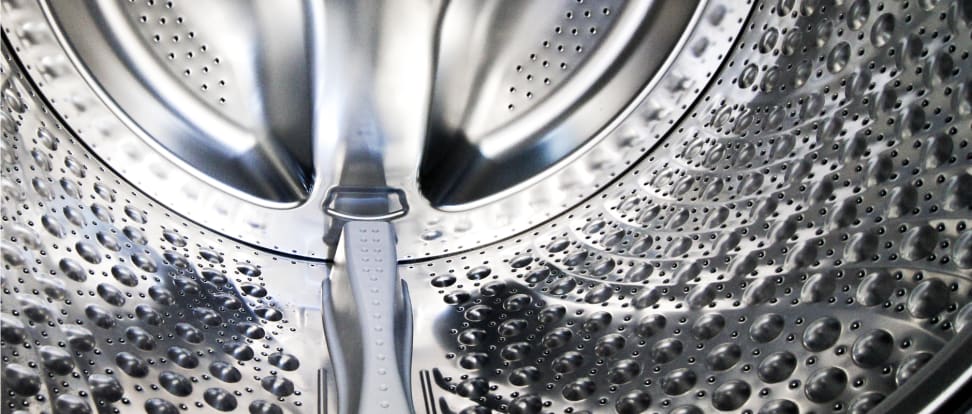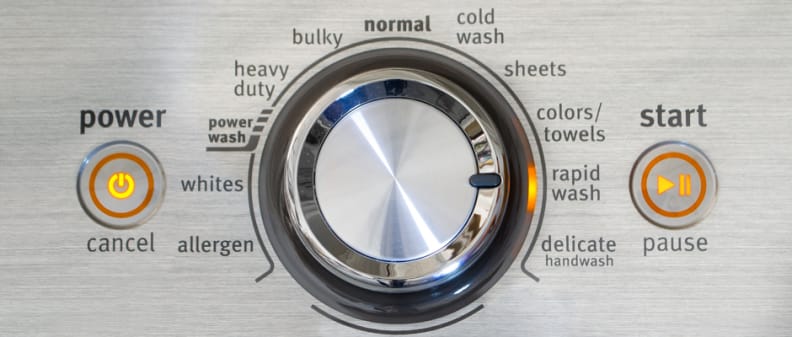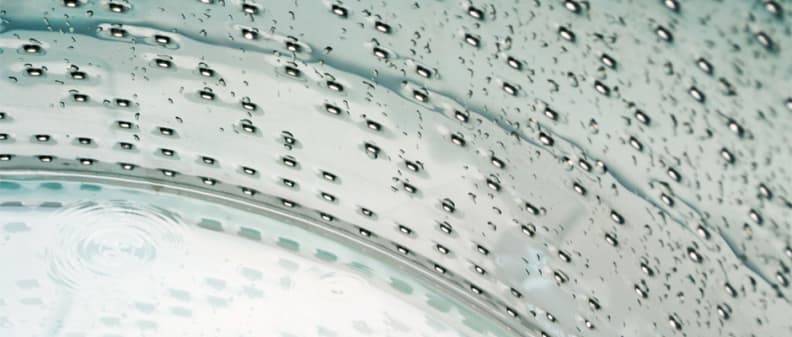Why Cold Water Washing Is the Future of Laundry
We've come a long way from boiling our clothes. Here's why warm water is increasingly unnecessary.
 Credit:
Reviewed.com
Credit:
Reviewed.com
Products are chosen independently by our editors. Purchases made through our links may earn us a commission.
Chemical, mechanical, thermal—these are the three forces that determine whether or not your laundry is clean when the buzzer sounds. It's easy to see the first two at work. You see the detergent sudsing and your washer spinning at 1,200 rpm. But what a lot of consumers overlook is the temperature of their wash water.
Back in the day–before washing machines or soap–people cleaned their laundry by boiling it in water. Aside from killing lice, hot water helped get rid of sweat and greasy stains. Fast forward a thousand years and the act of boiling clothes has mostly been relegated to emergencies and Renaissance Fairs. Now, we rely on mechanical action from our washers and chemical reactions from our detergents. Warm water is no longer necessary.
Why is that? Well, in short, today's laundry technology is able to get stains out of clothes at lower temperatures—and it's happening whether you like it or not.
Cold-Water Detergents
According to Jack English, senior scientist at Procter & Gamble, the average wash temperature actually fell by about 20 degrees from 2002 to 2010. That's because appliance manufacturers have been gunning for ever more stringent Energy Star requirements. One of the major criteria is having a low Integrated Modified Energy Factor (IMEF). The IMEF takes into account how much hot water a washer uses—and for good reason too, since hot water comprises up to 80 percent of a top loader's energy usage.
So when you set a new washer to warm, the water flowing into the drum is much cooler than those from previous generations. Less hot water means you're saving money and your laundry is having less of an impact on the environment. But remember that clean laundry trifecta? With less hot water, detergent and mechanical action need to pick up the slack.
Cue cold water detergents. P&G's Jack English helped develop Tide's Coldwater detergent over a decade ago. According to him, the focus was on developing chemical activities that would work independent of temperature. "We chose catalytic chemistries that are not as susceptible to lower temperatures," he explains.
What does that mean? Well, a certain amount of energy needs to be around for anything to get done. For example, there's an energy threshold that needs to be crossed before you get your butt off the couch and clean your house. If the threshold isn't reached, then you'll likely pop in another Blu-ray of Game of Thrones. Traditionally, the energy needed to cause a reaction between your detergent and stains came from hot water. However, as the average temperature for each cycle falls, those types of detergents become less effective.

Soap molecules like these typically get their energy from hot water. So cold water detergents need to bring their own energy to the party.
So what English and his team developed was a detergent that brought its own energy to the party via recycled enzymes developed by DuPont. However, certain types of stains, like grease, will only react well with hot water. (This is why shoreline oil spills are often treated with steaming water.) So against oily stains, the laws of nature are difficult to surmount.
{{amazon name="Honey-Can-Do DRY-01610 Heavy Duty Gullwing Drying Rack, White", asin="B00383O2UU", align="right"}} The moral of this soapy tale is that if your clothes are coming out less clean in your new washer, it may be because of the water temperature. But before you turn that dial to hot, think about how much your utilities cost. It may behoove you to switch to a detergent that's better suited for colder climates. Although a quick search shows that Tide's Coldwater detergent is slightly more expensive than its original formula, it may save you money in the long run. And in the really long run, P&G's sustainability goals may be what we all have to abide by anyway.
But wait, there's more! Besides temperature and detergent, there's still the washing machine itself.

More and more machines (like the Maytag MVWB880BW) have a cold wash cycle.
A Cold Cycle's Tale
Detergent alone cannot clean your clothes. Just try adding detergent to your laundry and letting it sit there. You'll discover after a few days that your clothes are actually dirtier. What's missing from the equation is water and mechanical action, both of which are provided by a washer.
Jon Strait helped develop cold water cycles for Whirlpool as a lead engineer. He points out that washing in cold water requires "a reduced volume of water." This results in more physical contact among fabrics. "In essence," he says, "we're boosting the mechanical action and boosting the chemical action."
From this perspective, it looks like cold water cycles use less overall water, which is contrary to what you might have believed. In the past, most washers relied on lots of hot water running throughout the laundry. But as technology has changed, our attitudes have not. Strait went on to explain: "The biggest change is the perception of what the customer has always done versus what they're going to be doing in the future."

According to Jon Strait, cold wash cycles work by increasing detergent concentration and mechanical action.
Governments are pushing for cold water washes. The need to heat up water has actually put strains on the power grid. In Southern California, there's even a rebate offered for buying a machine that is defaulted to a cold water temperature. However, the consumer is still the ultimate decider of their laundry's temperature.
Wishy-washy Future
Unlike TVs, cellphones, and computers, consumers don't often gravitate towards the latest trends in appliance technology. Since most people don't buy a washing machine until their old one breaks, they tend to be a few generations behind in laundry advances. That means change in the laundry world is slow.
Is washing in cold water the future? The costs of water and electricity are rising, and money can be saved if we all start using nothing but cold water. However, old habits die hard. Hot water will remain a great way to get stains out, but it's no longer the only way.
